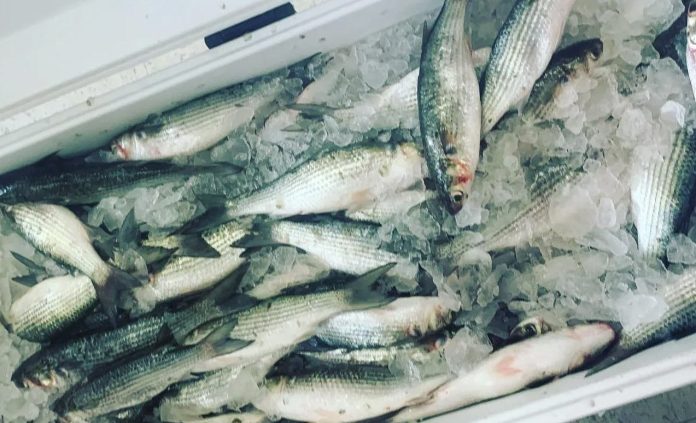
In a unanimous decision today, the North Carolina Marine Fisheries Commission voted to close striped mullet fishing on Saturday and Sunday from Jan. 1 to Sept. 30 and on Saturday, Sunday, and Monday from Oct. 1 to Dec. 31 as its preferred fishery management for mullet during its quarterly business meeting today in New Bern.
The MFC also voted to decrease the recreational daily bag limit on mullet from 200 fish to 100 fish, place a 400-fish maximum limit on vessels, and adopt adaptive framework, which will allow for additional season closures, day-of-the-week closures, trip limits, and gill net yardage and mesh size restrictions if current measures are not meeting the target.
While members of the MFC were concerned that day-of-the-week closures would not bring 21.3 percent to 35.4 percent harvest reduction the Department of Marine Fisheries is targeting, the committee members needed a supermajority of votes to vote against the new DMF recommendations and did not want the earlier mullet amendment, which closed the season in November and December, to remain in place.
Sammy Corbett, vice-chair of the MFC and a commercial fisherman, was not able to fish for mullet during the closure last year, he said.
“I really don’t want that to happen again,” said Corbett, who made the motion to adopt the DMF’s new recommendations. “If we don’t do something here today, that’s going to happen again, and nobody’s going to be able to fish frozen mullet during that time period.”
Commercial fishermen, recreational fishermen, and tackle shop owners spoke during public comment periods on Wednesday evening and Thursday afternoon. Many are worried that increased mullet regulations will further harm North Carolina’s fishing industry.
Tackle shops rely on commercial fishermen catching fresh mullet. The proposed day-of-the-week closures could leave tackle shops without fresh mullet for a week at a time, said Stephanie Bayne, an owner of Frank & Frans Bait & Tackle in Avon, during public comment.
In 2023, Frank & Fran’s paid local Hatteras Island commercial fishermen $40,000 for fresh mullet and sold $80,000 of mullet to recreational fishermen, Bayne said.
“The Outer Banks Chamber of Commerce reports that more than five million people visit the Outer Banks of North Carolina each year with surf fishing being one of those top reasons,” Bayne said. “It is clear the overall human and economic impact of these closures are far-reaching.”

New regulations on mullet will also affect fishing tournaments in Dare County, which bring in millions of dollars to tackle shop owners, vacation rental owners, and restaurants, said Chris Greening, the owner of TW’s Bait & Tackle in Nags Head.
“The economic impact to our county is going to be significant,” Greening said to the MFC.
After a stock assessment ending in 2019 from the North Carolina Department of Marine Fisheries found mullet is overfished and overfishing is occurring, the DMF recommended a 33 percent reduction in total harvest to end overfishing in two years and end the overfished status in 10 years, the Island Free Press reported.
During public comment, Dare County Commissioner Steve House reiterated his stance that the data used in the stock assessment, which only goes to 2019, is “woefully unsustainable,” and the stock assessment is incomplete because it doesn’t have a full economic impact study.
North Carolina’s fishing industry has already decreased in recent years. In 2022, North Carolina had a 23.4 percent decrease in total commercial fishing, House said.
“That’s a big hit to everybody’s economy,” House said.
This month, Wanchese Fish Company, a global seafood supplier owned by Cooke Inc., announced it is closing the Wanchese-based facility on March 29, Coastal Review reported.
Wanchese Fish Company is moving out of North Carolina, because the state’s fisheries are too overregulated, House said.
After public comment at advisory committee meetings in January, the DMF changed its recommendations from daily trip limits to day-of-the-week closures.
In December, the DMF recommended a 50-pound daily trip limit for January for commercial fishermen, a 500-pound daily trip limit from Feb. 1 to Oct. 15, no daily trip limit for roe season from Oct. 16 to Nov. 15, a 50-pound daily trip limit from Nov. 16 to the end of the year, and a 50-pound daily trip limit on Saturdays and Sundays throughout the year, the Island Free Press reported.
The DMF also recommended a 30,000-pound season limit on stop net fishing, a 50-bag limit for recreational fishermen, and adaptive management framework, the Island Free Press reported.
“During the public comment period and MFC advisory committee meetings, there seemed to be [a] strong preference for simple management that would impact the fishery equally across the coast,” said Jeff Dobbs, a conservation biologist for the DMF, explaining the DMF’s changed recommendations to the MFC.
The DMF estimates the weekend closures and three-day closures will reduce mullet harvest by 34.9 percent, Dobbs said.
John Machie, a year-round commercial mullet fisherman, suggested that the DMF and MFC complete a stock assessment for mullet every two years, because that is when mullet reach maturity, and place limits on the amount of mullet caught so that the MFC can close the fishery if necessary.
“As a full-time commercial fisherman, I depend on this fishery and do not want to see it destroyed by myself, other fishermen, or by the Marine Fisheries,” Machie said. “Without a way to stop fishing when we have reached this threshold that you are placing, you are setting us up for failure.”
Consumers are the largest stakeholders, who are often forgotten about when discussing fishery policy, said Barbara Garrity-Blake, a professor at Duke University and former member of the MFC who represented NC Catch, a nonprofit promoting local seafood, during public comment.
North Carolina must maintain consumer access to locally-caught mullet, because it is an affordable source of protein, in high demand across a variety of cultural and ethnic groups, and an important subsistence fishery, Garrity-Blake said.
“We at NC Catch urge you to be truly adaptive in your striped mullet management strategy by choosing the smallest harvest reduction within your range of options that provides for the sustainability of the stock and maintains fair access for anglers, commercial fishermen, and consumers,” Garrity-Blake told the MFC.
The Department of Environmental Quality secretary and legislative bodies will review the fishery management plan in March or April, and the MFC will vote for final approval in May before implementing the plan.





